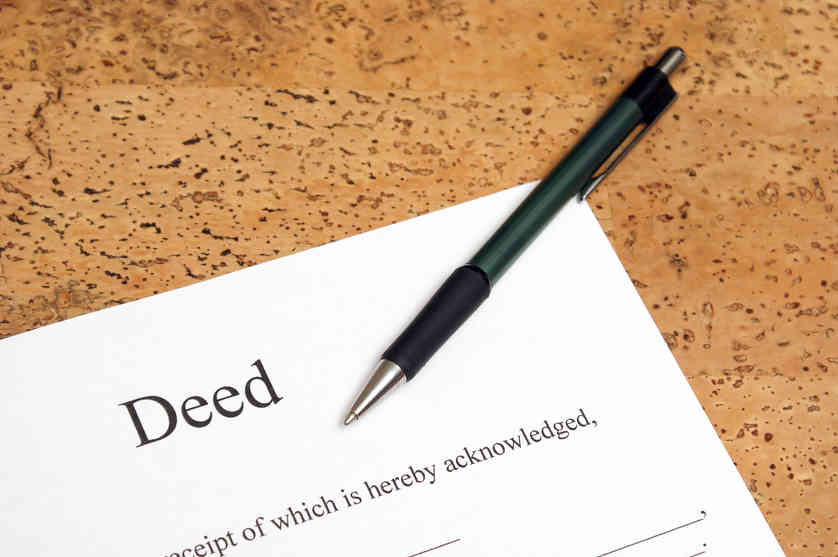Disclaimer Deed and Divorce in Arizona | Hildebrand Law, PC

The Arizona family law attorneys at Hildebrand Law, PC want to provide you with information regarding the restrictions on selling a home during an Arizona divorce. The Arizona Court of Appeals issued a seminal decision regarding the effect of signing a Disclaimer Deed signed in Arizona on a home purchased during an Arizona marriage in the case of Bell-Kilbourne v. Bell-Kilbourne.
The evidence at trial established that the parties were married on February 15, 2000. The parties, thereafter, decided to purchase a home and chose to apply for a loan in Wife’s name only for the sole purpose of improving her credit score and because the Husband had a poor credit rating. The home was, therefore, titled in Wife’s sole name as her sole and separate property.

The husband subsequently signed a Disclaimer Deed indicating he waived any community property interest in the home and confirming the home as Wife’s sole and separate property. The parties paid the mortgage with community funds throughout their marriage.
The Arizona divorce trial court ruled that the evidence presented at trial clearly proved the parties’ intention at the time they purchased the home was that the home was to be community property and, further, that Husband did not intend to gift his community property residence to Wife as her sole and separate property.
The Arizona Court of Appeals’ analysis of the issue began with the rule of law in Arizona that all property acquired during a marriage in Arizona is presumed to be community property, pursuant to another appellate case; namely Rickenbaugh v. Deane.
Thereafter, property acquired by either spouse during a marriage retains that character as community or sole and separate property throughout the marriage, citing the Arizona Appellate case of Honnas v. Honnas.
The Arizona Court of appeals referred back to its prior ruling in Bender v. Bender for the proposition that spouses are free to determine the status of their property during a marriage as either sole and separate property or community property.

The Arizona Court of Appeals concluded that the Husband waived his community property interest by signing the Disclaimer Deed to the home. The Court specifically rejected the Husband’s attempt to distinguish his case was different from the prior Bender case because community funds were used to purchase the home whereas separate funds were used to purchase the home in the Bender case.
Specifically, the Court held that the Bender decision was not based upon whether separate or community funds were used to purchase the property but, instead, the sole existence of a Disclaimer Deed signed by a spouse. The Court also noted that the Husband had not claimed his signing of the Disclaimer Deed was the result of Fraud or Mistake.
The Arizona Court of Appeals specifically rejected the argument that the intention of the parties as to whether the home would be separate or community property did not matter and that the plain language of the Disclaimer Deed providing that the Wife was to take ownership of the property as her sole and separate property was to be enforced.
The Court also distinguished the prior Arizona Supreme Court’s ruling in the In Re Sims’ Estate case by ruling that held a trial court must determine the parties’ intentions at the time the property is acquired, as well as a demonstrating of contemporaneous conduct consistent with that intent.
The court justified its distinction on the In Re Sims’ Estate case by pointing out that the husband in this case never had an interest in the home when it was purchased and, therefore, the requirement of Sims’ that contemporaneous conduct inconsistent with the intent to waive a community property interest in the home applied.
The wife rebutted the presumption that the home acquired during the marriage was community property by introducing the Disclaimer Deed into Evidence. The burden of proof then shifted to the Husband to present sufficient evidence to establish a community property claim to the home.

Disclaimer Deed and Divorce in Arizona | Don’t Forget the Community Lien
Although the Arizona Appellate Court confirmed the home as Wife’s sole and separate property, it also concluded the community has an interest in the home as a result of the creation of a “community lien”, as a result of the community funds that were used to decrease the mortgage balance owed on the home and community funds used to make improvements to the home to the extent it increased the value of the home.
The take away from this case is that a spouse who signs a Disclaimer Deed to a home or other parcel of real estate presumptively waives their community property interest in that property.
That spouse then bears the burden of proving that the signing of that Disclaimer Deed was the result of fraud, mistake or other evidence to establish the home was community property, such as a subsequent Deed titling the home back to the parties as community property.
The other take away was the recognition of the existence of a community lien against the home. Understanding that the community lien is not an ownership interest in the home but, instead, an unsecured community claim against the home.
This community lien is not the equivalent of the amount of the payment made in the home but, instead, is only the extent to which the mortgage balance was decreased.
Also, the community lien is not the amount spent on the home to improve it but, instead, the extent to which those improvements increased the market value of the home. Even then, you should understand that community lien belongs to both Husband and Wife such that it will be equitably divided between both Husband and Wife, which likely results in the Husband receiving only one-half of those amounts.
The Story May Not End There

The Arizona Court of Appeals in the In re the Matter of Flowers case held that although a sole and separate home was turned into community property during the marriage, a trial court may have the authority to award 100% of that home to the spouse who originally owned it as sole and separate property if it is equitable to do so.
If you have questions about disclaimer deed and divorce in an Arizona divorce case, you should seriously consider contacting the attorneys at Hildebrand Law, PC. Our Arizona community property and family law attorneys have decades of combined experience successfully representing clients in community property disputes and family law cases.
Our family law firm has earned numerous awards such as US News and World Reports Best Arizona Family Law Firm, US News and World Report Best Divorce Attorneys, “Best of the Valley” by Arizona Foothills readers, and “Best Arizona Divorce Law Firms” by North Scottsdale Magazine.
Call us today at (480)305-8300 or reach out to us through our appointment scheduling form to schedule your personalized consultation and turn your Arizona community property or family law case around today.
Contact Form
Other Articles About Community Property in Arizona
- ARIZONA COMMUNITY PROPERTY LAWS
- VALUING GOODWILL OF A LAWFIRM IN AN ARIZONA DIVORCE
- COMMUNITY PROPERTY AND ANNULMENT OF MARRIAGE IN ARIZONA
- SOLE AND SEPARATE FUNDS USED TO BUY A HOUSE IN ARIZONA
- DIVISION OF MILITARY RETIREMENT AND DISABILITY PAYMENTS IN AN ARIZONA DIVORCE
- SEPARATE PROPERTY CONTRIBUTIONS WHEN DIVIDING COMMUNITY PROPERTY IN ARIZONA
- PROPERTY HELD AS JOINT TENANTS WITH RIGHTS OF SURVIVORSHIP IN AN ARIZONA DIVORCE
- DIVIDING RETIREMENT ACCOUNTS IN AN ARIZONA DIVORCE
- ARIZONA DIVORCE DEBT
- EFFECT OF PLACING COMMUNITY PROPERTY INTO A FAMILY TRUST IN ARIZONA
- COMMUNITY PROPERTY LOTTERY WINNINGS IN ARIZONA
- IS SEPARATE PROPERTY LIABLE FOR COMMUNITY DEBT IN ARIZONA
- CREDITOR COLLECTING A SEPARATE DEBT WITH COMMUNITY PROPERTY IN ARIZONA
- TITLE AFFECTS COMMUNITY PROPERTY RIGHTS IN ARIZONA
- COMMINGLING SEPARATE PROPERTY WITH COMMUNITY PROPERTY IN ARIZONA
- ARE MILITARY RETIREMENT PAYMENTS COMMUNITY PROPERTY IN ARIZONA
- EFFORT DOES NOT ENTITLE A SPOUSE TO MORE COMMUNITY PROPERTY IN ARIZONA
- RESULT OF COMMINGLING COMMUNITY AND SEPARATE PROPERTY IN ARIZONA
- INCREASED VALUE OF A BUSINESS IN AN ARIZONA DIVORCE
- GIFT OF SEPARATE PROPERTY THROUGH A JOINT TENANCY DEED IN ARIZONA
- ABANDONMENT OF MARRIAGE AND COMMUNITY PROPERTY RIGHTS IN ARIZONA
- ARE PROFITS FROM A SEPARATE BUSINESS COMMUNITY OR SEPARATE PROPERTY
- TRACING SEPARATE PROPERTY COMMINGLED WITH COMMUNITY PROPERTY IN ARIZONA
- INTENTION CONTROLS TRANSMUTATION OF SEPARATE INTO COMMUNITY PROPERTY
- RECORDING A HOME IS INSUFFICIENT TO CHANGE SEPARATE PROPERTY INTO COMMUNITY PROPERTY
- COMMUNITY PROPERTY INTEREST IN A BUSINESS OWNED PRIOR TO MARRIAGE
- WHAT IS SEPARATE PROPERTY IN ARIZONA
- VALUATION AND DISTRIBUTION OPTIONS FOR A PENSION IN AN ARIZONA DIVORCE
- UNFAIR SEPARATION AGREEMENT IN ARIZONA
- UNEQUAL DIVISION OF PROPERTY IN A DIVORCE IN ARIZONA
- SEPARATE PROPERTY USED PURCHSE A HOME DURING MARRIAGE IN ARIZONA
- REIMBURSEMENT FOR PAYING SEPARATE DEBTS OF A SPOUSE IN ARIZONA
- REFUSAL TO SELL A HOUSE AFTER A DIVORCE IN ARIZONA
- PENSIONS AND DIVORCE IN ARIZONA
- MILITARY RETIREMENT PAY AND DIVORCE IN ARIZONA
- IS SEPARATE PROPERTY DIVIDED DIFFERENTLY THAN COMMUNITY PROPERTY IN ARIZONA
- IS ARIZONA A 50-50 STATE IN A DIVORCE
- IS ALL PROPERTY OWNED BY EITHER SPOUSE COMMUNITY PROPERTY IN ARIZONA
- INTEREST ON A LOAN BETWEEN SPOUSES IN ARIZONA
- IMPACT OF IMPROVEMENTS TO SEPARATE PROPERTY IN AN ARIZONA DIVORCE
- HOW TO ENFORCE DIVISION OF PROPERTY AND DEBT IN ARIZONA
- HOW TO DIVIDE PROPERTY IN ARIZONA WHEN A SPOUSE IS HIDING ASSETS
- HOW STOCK OPTIONS ARE DIVIDED IN AN ARIZONA DIVORCE
- HOW IS COMMUNITY PROPERTY DIVIDED IN ARIZONA
- HOW ARE RETIREMENT ACCOUNTS DIVIDED IN AN ARIZONA DIVORCE
- FILING A LIS PENDENS IN A DIVORCE IN ARIZONA
- FAIR COMPENSATION DEFENSE IN AN ARIZONA DIVORCE
- ENFORCE A PROPERTY SETTLEMENT AGREEMENT IN ARIZONA
- DO RULES REGARDING PROPERTY APPLY TO DEBTS IN ARIZONA
- DIVISION OF DEBT IN AN ARIZONA DIVORCE
- DIVIDING PROPERTY NOT INCLUDED IN A DIVORCE DECREE IN ARIZONA
- DIFFERENCE IN COMMUNITY AND SEPARATE PROPERTY IN ARIZONA
- DETERMINING COMMUNITY VERSUS SOLE PROPERTY IN ARIZONA
- CREATION OF A COMMUNITY LIEN ON SOLE AND SEPARATE PROPERTY IN ARIZONA
- COMMUNITY PROPERTY LAWS ABOUT A SPOUSE’S PERSONAL GUARANTEE IN ARIZONA
- CHOOSING A VALUATION DATE WHEN DIVIDING ASSETS IN A DIVORCE IN ARIZONA
- CAN A SPOUSE BE HELD LIABLE FOR CREDIT CARD DEBT IN ARIZONA
- CALCULATING A COMMUNITY LIEN ON A DEPRECIATING ASSET IN ARIZONA
- EFFECT OF A DISCLAIMER DEED OR QUIT CLAIM DEED IN A DIVORCE IN ARIZONA
- CALCULATING A COMMUNITY LIEN ON AN APPRECIATING ASSET IN AN ARIZONA DIVORCE
- BANK ACCOUNTS AND DIVORCE IN ARIZONA
- DIVIDING PAID TIME OFF IN A DIVORCE IN ARIZONA
- EQUALIZATION PAYMENTS IN AN ARIZONA DIVORCE
- OMITTED ASSETS IN AN ARIZONA DIVORCE DECREE
- CRSC PAY AND DIVORCE IN ARIZONA
- JUDGMENT FOR SEPARATE PROPERTY STOLEN DURING MARRIAGE
- JUDGE IGNORES A BUSINESS APPRAISAL IN AN ARIZONA DIVORCE
- REIMBURSEMENT OF SEPARATE PROPERTY IN A DIVORCE IN ARIZONA
- SEPARATE PROPERTY INCREASES IN VALUE DURING MARRIAGE IN ARIZONA
- PERSONAL INJURY AWARDS AND DIVORCE IN ARIZONA
- VALUING A BUSINESS IN A DIVORCE IN ARIZONA WITHOUT FINANCIAL DOCUMENTATION
- RETIREMENT INCREASE AFTER DIVORCE IN ARIZONA
- FAILURE TO DISCLOSE FINANCIAL INFORMATION IN A DIVORCE IN ARIZONA
- UNAUTHORIZED USE OF A POWER OF ATTORNEY TO DISPOSE OF SPOUSE’S SEPARATE PROPERTY
- FINANCIAL AGREEMENTS BETWEEN UNMARRIED COUPLES IN ARIZONA
- WHEN A CREDITOR MAY TAKE SOLE AND SEPARATE ASSETS OF A SPOUSE
- LIABILITY FOR A SPOUSE’S NEGLIGENCE IN ARIZONA
- VALUATION OF STOCK HOLDINGS AND DEBT IN AN ARIZONA DIVORCE
- LOANS BEFORE MARRIAGE IN ARIZONA
- CREDITOR LIEN ON JOINT TENANCY PROPERTY IN AN ARIZONA DIVORCE
- INCREASE IN VALUE OF A SEPARATE PROPERTY BUSINESS STOCK IN AN ARIZONA DIVORCE
- STATEMENTS REGARDING PROPERTY ARE BINDING IN AN ARIZONA DIVORCE
- DEBTS NOT INCLUDED IN A DIVORCE DECREE IN ARIZONA
- FRAUDULENT QUIT CLAIM DEED IS INEFFECTIVE IN AN ARIZONA DIVORCE
- DISPOSITION OF COMMUNITY PROPERTY IN A LAST WILL AND TESTAMENT
- DIVIDING BUSINESS PROFITS DURING A DIVORCE IN ARIZONA
- MINORITY DISCOUNT IN A BUSINESS VALUATION IN AN ARIZONA DIVORCE
- HOW A BUSINESS IS DIVIDED IN A DIVORCE IN ARIZONA
- DIVISION OF CIVIL SERVICE RETIREMENT SYSTEM BENEFITS IN A DIVORCE IN ARIZONA
- DISABILITY PAY AND COMMUNITY PROPERTY IN ARIZONA
- VALUATION OF A PROFESSIONAL PRACTICE IN A DIVORCE IN ARIZONA
- JOINING A THIRD PARTY IN A DIVORCE IN ARIZONA
- CONTESTING A RULE 69 AGREEMENT WITHOUT A TRIAL IN ARIZONA
- DEFENSE TO REIMBURSEMENT FOR PAYMENT OF COMMUNITY BILLS IN AN ARIZONA DIVORCE
- SURVIVOR ELECTION AND MILITARY RETIREMENT IN AN ARIZONA DIVORCE
- DEFERRED MILITARY RETIREMENT IN AN ARIZONA DIVORCE
- DIVISION OF DEFERRED RETIREMENT OPTION PLANS IN AN ARIZONA DIVORCE
- CLAIMS OF WASTE IN AN ARIZONA DIVORCE
- DIVIDING ACCOUNTS RECEIVABLE IN A DIVORCE IN ARIZONA
- MINORITY DISCOUNT BUSINESS APPRAISAL IN AN ARIZONA DIVORCE
- FINDING A REALTOR DURING A DIVORCE IN ARIZONA
- WHAT TO DO IF YOUR SPOUSE IS HIDING ASSETS IN A DIVORCE IN ARIZONA
- TYPES OF BUSINESS APPRAISALS IN AN ARIZONA DIVORCE
- BENEFICIARY DESIGNATIONS AFTER DIVORCE IN ARIZONA
- RETIREMENT ACCOUNTS, QDROs, AND DIVORCE IN ARIZONA
- DIVORCE AND REFINANCING A MORTGAGE IN ARIZONA
- PROVING PROPERTY IS SOLE AND SEPARATE IN AN ARIZONA DIVORCE
- 7 REASONS YOU MAY HAVE TO SHARE YOUR INJURY SETTLEMENT IN AN ARIZONA DIVORCE
- PERSONAL INJURY SETTLEMENT IN A DIVORCE IN ARIZONA
- CLAIM OF A SPOUSE’S PERSONAL INJURY AWARD IN AN ARIZONA DIVORCE
- PERSONAL INJURY AWARDS AND DIVORCE SETTLEMENTS IN ARIZONA
- DIVORCE AND PERSONAL INJURY AWARDS IN ARIZONA
- ENFORCING A SURVIVOR BENEFIT ELECTION IN A PENSION IN ARIZONA
- MURDERER SPOUSE AND COMMUNITY PROPERTY IN ARIZONA
- DAMAGES CAUSED BY A COMMUNITY PROPERTY VEHICLE IN ARIZONA
- COMPENSATION FOR WASTE OF COMMUNITY ASSETS IN ARIZONA
- USING SEPARATE FUNDS TO BUY JOINT PROPERTY IN ARIZONA
- TRANSMUTING SEPARATE PROPERTY INTO COMMUNITY PROPERTY BY COMMINGLING
- LIABILITY FOR DEBT GUARANTEED BY THE OTHER SPOUSE IN ARIZONA
- USING COMMUNITY FUNDS TO PAY A MORTGAGE ON A SPOUSE’S SOLE AND SEPARATE HOUSE
- COMMUNITY LIEN ON A SOLE AND SEPARATE BUSINESS IN A DIVORCE IN ARIZONA
- YOU’RE GETTING A DIVORCE, ARE YOU SURE YOU WANT THE HOUSE?
- CHANGING JOINT PROPERTY TO COMMUNITY PROPERTY IN ARIZONA
- SEGREGATING SEPARATE PROPERTY FROM COMMUNITY PROPERTY IN ARIZONA
- ARIZONA COMMUNITY PROPERTY LAWS FREQUENTLY ASKED QUESTIONS

